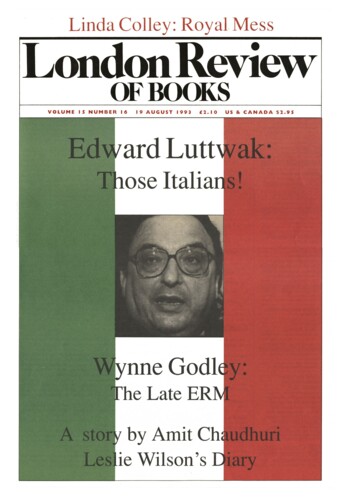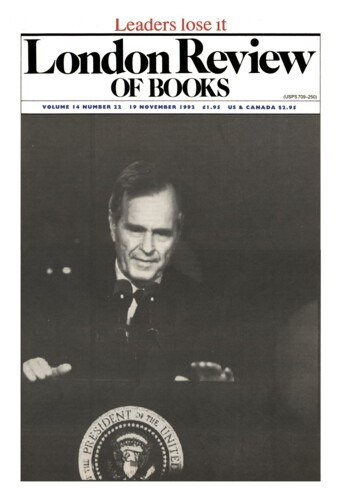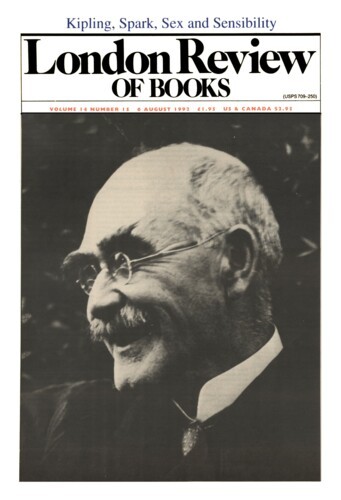Colin McGinn
Colin McGinn a reader in philosophy at University College London, is soon to take up the position of Wilde Reader in Mental Philosophy at Oxford. He is the author of Wittgenstein on Meaning.
Cooling it
Colin McGinn, 19 August 1993
Donald Davidson is perhaps the most distinguished philosopher in history never to have written a book. Indeed, he did not get round to writing articles until he was into his forties (he is now 76). Yet those articles – short, intense, allusive, hard – have changed the shape of contemporary analytical philosophy. They were in mid spate when I was a graduate student at Oxford in the early Seventies, and they acted as a kind of philosophical IQ test for the young philosophers of my generation. I well remember poring with tormented excitement over ‘Truth and Meaning’ and ‘Mental Events’, two of the most influential (and contested) articles of recent times. These cryptic texts gave the impression of well-honed conjuring tricks, in which the deepest of problems were given tantalisingly rigorous and ingenious solutions. In those days you were either a ‘Davidsonian’ or you weren’t; you certainly had to find out where you stood. But it wasn’t easy, because each Davidson article presupposed the others, and they assumed you were good at logic. It became clear that Davidson had a system, but it needed to be pieced together by the reader, as best he or she could. Puzzlement about a particular Davidson piece would be met with a knowing look from the initiated and the query ‘But have you read “In Defence of Convention T”?’ The very plainness of his name (often transmuted to David Donaldson) lent an aura of mystique to the plosive economy of the Davidson corpus. And the man himself, with his startling blue eyes and precisely articulated mode of speech, his unhurried confidence, his immersion in his own vision, his neatness, certainly encouraged the feeling that he had it all figured out, and all you had to do was figure him out. It did no harm, too, to discover that Davidson had been an enemy aircraft spotter in the US Navy in the Second World War, that he was a trained pilot, that he went gliding for a hobby, that he has climbed mountains, that there are very few places in the world he hasn’t visited. Davidson wasn’t just profound: he was cool (and there aren’t many philosophers you can say that about). Davidson had nerve.’
You would not want to be him
Colin McGinn, 19 November 1992
Bertrand Russell’s first and formative love affair was with symbolic logic. But the relationship, though fertile, was troubled. Beginning in rapture, as he moulded and extended the new concepts and techniques, sweeping away the barren detritus of two millennia, the affair eventually foundered on a stinging paradox, unexpected and intractable, which abruptly took the shine off the whole thing. His devotion crumbled, and he was driven to seek comfort elsewhere, never quite regaining his former idealism. It must have been very disillusioning, and no doubt tainted his other romantic involvements, which also began in ecstasy and then became mired in refractoriness of one kind or another. For the antinomial is not adorable. And if logic can’t be trusted, what can?
Getting the wiggle into the act
Colin McGinn, 10 September 1992
Consciousness is not sempiternal, it has a history, a natural genesis. Once upon a time the universe contained no consciousness; then it sprang up here and there; and now the planet is flooded with the stuff. This is not to make the trivial observation that what people think and feel changes over time and generations, sometimes quite radically; it is a point about the deep biological roots of consciousness. Just as animal bodies are products of a long evolutionary process, in which chance variation is rigorously winnowed by natural selection, so animal minds must have a remote genesis in the mechanisms of differential survival as they worked on the available materials. Eyes gradually emerged as engines for exploiting the information contained in light, relying on the given chemical and optical properties of matter; and consciousness likewise must have emerged for some good biological reason, building on the prior properties of organisms. The question is how and why this happened: how did mentality arise from cell tissue? Answering this question would tell us not merely about the aetiology of consciousness: it would also help us to understand the nature of consciousness – particularly its relation to its physical substrate. If we knew the history of mind, then we would have effectively solved the mind-body problem, since we would understand how consciousness arises from matter.
My Guy
6 August 1992
Pieces about Colin McGinn in the LRB
Avoiding Colin
Frank Kermode, 6 August 1992
Once there were popular books with titles like Straight and Crooked Thinking, books in which professional philosophers, avoiding arcane speculation, tried to make the rest of us more sensible by...
Too hard for our kind of mind?
Jerry Fodor, 27 June 1991
Whatever, you may be wondering, became of the mind-body problem? This new collection of Colin McGinn’s philosophical papers is as good a place to find out as any I know of. Published over a...
Putnam’s Change of Mind
Ian Hacking, 4 May 1989
Big issues and little issues: among established working philosophers there is none more gifted at making us think anew about both than Hilary Putnam. His latest book is motivated by large...
An End to Anxiety
Barry Stroud, 18 July 1985
Wittgenstein predicted that his work would not be properly understood and appreciated. He said it was written in a different spirit from that of the main stream of European and American...
Persons
Brian O’Shaughnessy, 1 April 1983
The philosophy of mind is a branch of the philosophy of nature. But it has this peculiarity, that the very item that conjures up its questions and vets its answers is the very part of nature...
Read anywhere with the London Review of Books app, available now from the App Store for Apple devices, Google Play for Android devices and Amazon for your Kindle Fire.
Sign up to our newsletter
For highlights from the latest issue, our archive and the blog, as well as news, events and exclusive promotions.




